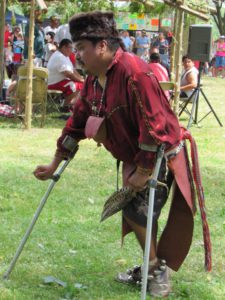
- Details
- By Native News Online Staff
FARMINGTON, N.M. — The Native American Disability Law Center on Monday asked the Indian Health Service (IHS) for reassurance that agency provisions are in place to make sure with American Indian and Alaska Natives with disabilities have equal access to medical care and equipment during the COVID-19 pandemic.
In correspondence sent Rear Admiral Michael D. Weahkee, the principal deputy director of the Indian Health Services, the Law Center says it is concerned because the IHS medical rationing policy is not publicly available, and disability advocates are concerned by the lack of response they have received from Indian Health Services on the issue.
“Frequently, people with disabilities are viewed as having a lower quality of life, which is not true. All individuals regardless of having a disability or not deserve an opportunity to live full lives. During this time especially that means everyone deserves equal access to medical care,” the Law Center’s Executive Director Therese Yanan said.
According to the US Census, 24 percent of American Indians and Alaska Natives have a disability, compared to 19 percent of the general population. However, many American Indians and Alaska Natives with disabilities are either unserved or underserved, according to the Law Center.
Yanan says calls and emails to regional and national IHS staff and leadership have gone unanswered, and the situation at IHS hospitals continues to worsen.
During an April 8, 2020 webinar call, Navajo Nation officials stated that IHS hospitals on the Navajo Nation are currently at capacity, are experiencing staff shortages, lack Personal Protective Equipment (PPE), and have closed smaller clinics in order to staff hospitals. The COVID-19 pandemic has hit Native American communities particularly hard and fair policies to ensure equal access to medical care are essential.
Yanan said IHS needs to make their medical rationing policies publicly available and fulfill its mandate to provide services in a non-discriminatory manner with language that safeguards the civil rights of Native Americans with disabilities.
“In this public health emergency, Native Americans with disabilities are especially at risk. Medical care rationing protocols can include ‘quality of life’ considerations that open the door to negative stereotypes about the lives of people with disabilities that can result in not being equally considered for medical care, like use of a ventilator, that they have a legal right of equal opportunity to. This equal opportunity is required by federal anti-discrimination laws, such as Section 504 of the Rehabilitation Act,” Yanan said.
An inquiry to IHS by Native News Online was not answered by press time.
More Stories Like This
Native News Weekly (August 25, 2024): D.C. BriefsNavajo Nation Mourns the Passing of Former Vice President Rex Lee Jim
Deb Haaland Earns Endorsement From Communications Workers of America Local 7076
University Soccer Standout Leads by Example
Two Native Americans Named to Democratic Congressional Campaign Committee's“Red to Blue” Program
Help us defend tribal sovereignty.
At Native News Online, our mission is rooted in telling the stories that strengthen sovereignty and uplift Indigenous voices — not just at year’s end, but every single day.
Because of your generosity last year, we were able to keep our reporters on the ground in tribal communities, at national gatherings and in the halls of Congress — covering the issues that matter most to Indian Country: sovereignty, culture, education, health and economic opportunity.
That support sustained us through a tough year in 2025. Now, as we look to the year ahead, we need your help right now to ensure warrior journalism remains strong — reporting that defends tribal sovereignty, amplifies Native truth, and holds power accountable.
 The stakes couldn't be higher. Your support keeps Native voices heard, Native stories told and Native sovereignty defended.
The stakes couldn't be higher. Your support keeps Native voices heard, Native stories told and Native sovereignty defended.
Stand with Warrior Journalism today.
Levi Rickert (Potawatomi), Editor & Publisher

